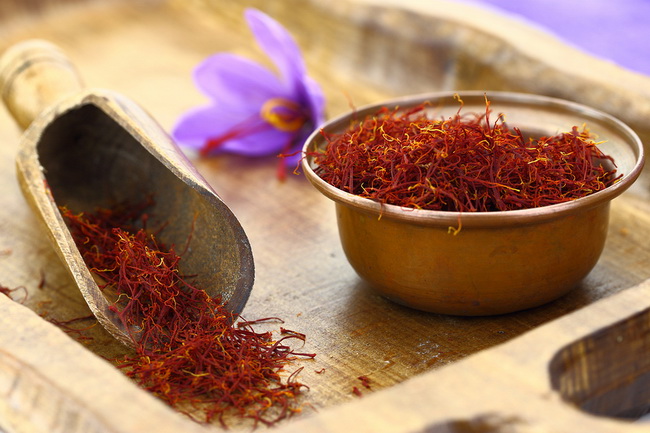- Make It Yourself Lavender Heart-Shaped Bath Bombs!
- 20 Things You Never Knew About “Down There”
- 12 Best Foods For Those Suffering From Arthritis Pain
- 12 Personal Hygiene Mistakes Almost Everyone Makes (Mom Never Told You About #4!)
- 15 Medicinal Plants And Herbs From The Cherokee People
- 12 Mind-Blowing Benefits Of Drinking Coconut Water During Pregnancy
- 12 Outstanding Winter Foods That Won’t Fatten You Up Like A Christmas Turkey
3 Natural And Traditional Remedies For Depression

Photo credit: bigstock.com
Millions of people around the world are afflicted by some form of depression. The condition has always existed throughout history and has been known by many names over the years. During the Middle Ages in Western Europe, depression was referred to as “melancholy,” and for a period of time was actually classified as one of the Seven Deadly Sins, . Dduring this relatively dark period in Western understanding of science and medicine, depression was believed to be a choice. (Later on, when people began to understand that it was notn’t, “melancholy” was replaced with “Slothsloth,” or laziness.).
This historical aberration aside, manyMany cultures across the world experimented with natural methods for alleviating the symptoms of depression over the millennia. The people who developed these medicines weren’t not familiar with advanced neurochemistry and didn’t necessarily understand why they worked, but only that they did. These methods prevailed in traditional folk medicine for many years before the development of modern medicine. It was during the twentieth century that doctors began to consider that depression might actually be a manifestation of something happening in the brain at the neurochemical level.
The solution seemed obvious: alter the neurochemistry in people with depression so the depression goes away. What could go wrong? Thus, antidepressant medications were born, and Prozac, Zoloft, Cymbalta and the like have all become household names.
Of course, as we all know, these conventional medications for depression can produce some pretty serious side effects. Some people taking antidepressants experience strange dreams while sleeping, dry mouth, jitteriness and anxiety, drowsiness, and in some cases, even gastrointestinal side effects like diarrhea and nausea. Other side effects include a diminished sex drive and problems with sexual performance (such as erectile dysfunction, etc) and significant weight gain.
Everyone’s body is different, and no one knows exactly what, if any, unpleasant side effects they will experience with a given medication until they try oneit. What often happens is that the patient with depression has to take additional medications to counteract the negative side effects of their primary antidepressant. Next thing they know, they’re taking half a dozen pills every day.
For some people, antidepressants might be the right option. But for others, perhaps some of the traditional remedies of the past might get the job done. But what are these natural alternative methods for treating depression?
There are many different natural fruits, roots, herbs and other items which contain compounds which that can affect neurotransmitters and help reduce depression. Some of these include:
1. St. John’s Wortwort
This remedy is derived from a flower as well and has been used for centuries to ease anxiety, depression and other problems with mood, and numerous studies have found it to be as effective as some conventional medicines. Scientists are notn’t exactly sure how it works, but St. John’s Wort wort is believed to act as a natural serotonin reuptake inhibitor (SSRI), which is a the classification that medicines like Paxil and Prozac fall intounder. People taking St. John’s Wort wort should be careful though, as it can have potentially harmful interactions with certain drugs. Speak to a doctor before taking St. John’s Wortwort.
Continue to Page 2

Photo credit: bigstock.com
2. Saffron
Made from the dried stigma of a flower native to southwestern Asia, saffron is one of the most highly sought-after and expensive spices in the world. It has a subtle flavor and is used in numerous dishes in Indian, Iranian, Mediterranean and Middle Eastern cuisine. In traditional Persian (Iranian) folk medicine, saffron has also been used as a natural mood enhancer and remedy for depression. A 2007 study showed that supplementation with saffron was as effective as Prozac for improving the symptoms of depression outpatients. Another study also showed that patients talking saffron scored better on the Hamilton Depression Scale than patients taking imipramine, a conventional medication.
3. Turmeric
A key ingredient in curry and other staple items of Indian cuisine, turmeric has long been prized for medicinal use as well, and is particularly renowned for its powerful anti-inflammatory properties. A study on 56 participants with major depressive disorder (MDD) recently made the news when it was revealed to be as effective at improving symptoms as a conventional treatment. More research needs to be done, but these are encouraging findings for those looking for alternative treatments for MDD.
READ ALSO: New Research Finds Post-Birth Depression Can Occur In Fathers, Too
Now it isIt’s important to keep in mind that depression can be very serious, and one should never attempt to treat it based solely on an article they read online. If you’ areve been diagnosed with depression and/or are taking antidepressant medication, speak with your doctor! As mentioned above, any supplement, natural or otherwise, which alters your neurochemistry has the potential to interact with antidepressant drugs in potentially dangerous ways. Always seek professional medical guidance when considering taking any type of supplement or drug to treat depression.
References:
































